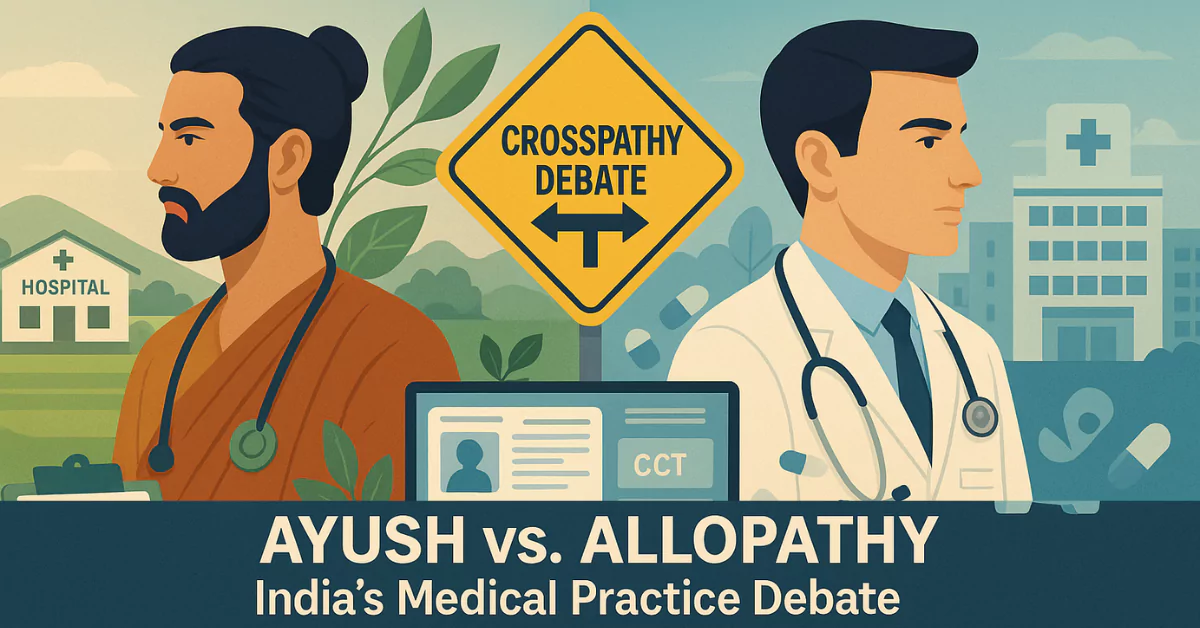AYUSH vs Allopathy: As a medical policy and education expert at a medical education consultancy firm, I found the debate over the role of AYUSH practitioners in India’s healthcare system really interesting and important.
On July 4, I covered the Vidit vs Liver Doc Controversy, which created the Allopathy vs Ayurveda/Traditional Medicine debate.
Today, I would like to revisit it and try to understand “what are the legal & medical limits for AYUSH Practitioners”. And also look at the main points raised in discussions about what AYUSH doctors can and can’t do, based on recent policies and controversies.
Who Are AYUSH Practitioners?
AYUSH refers to practitioners of Ayurveda, Yoga, Unani, Siddha, and Homeopathy. These are traditional systems of medicine, recognised and regulated by the government of India.
They hold recognised degrees from AYUSH medical colleges governed by the Ministry of AYUSH.
These professionals treat patients through natural, holistic, and age-old healing methods. They generally serve in rural and semi-urban areas where allopathic doctors are scarce.
Can AYUSH Doctors Practice Modern Medicine?
The debate about whether AYUSH doctors should be allowed to prescribe allopathic (modern) medicines or perform surgeries meant for MBBS doctors is old.
But the National Medical Commission (NMC) has made it clear that AYUSH practitioners should only practice the system they are formally trained in. NMC also prevent doctors from prescribing medicines from branches in which they are not trained or qualified.
There are some exceptions to it, too. Some states, like Madhya Pradesh, Rajasthan, Bihar, and Maharashtra, do allow AYUSH doctors to prescribe allopathic medicines in rural and primary healthcare centers, mainly due to a shortage of MBBS doctors.
What Is Crosspathy and Is It Legal?
Practising outside their own system is sometimes called “crosspathy”. And answer to the question “is it legal” – No, crosspathy is considered illegal and there is a legal penalty for non-compliance.
Over all in general, NMC strictly demands compliance from practising doctors in whatever field they are in. It has legal risk and a course of action, too. Non-compliance can have legal consequences. For example, in some states, AYUSH practitioners prescribing allopathic medicines can face fines or even jail time.
Now, you would like to know why this is Such a Big Issue?
First, in defence of allopathic doctors, allowing AYUSH practitioners who haven’t been fully trained in these areas to prescribe or treat patients with modern medicine could put patient safety at risk.
Allopathic doctors say prescribing modern medicine requires a deep understanding of pharmacology, dosage, drug interactions, and side effects.
On the other hand, many rural areas in India lack enough MBBS doctors. There is huge healthcare gaps and shortages of allopathy doctors and healthcare workers that are critically alarming in India, especially in rural India. AYUSH practitioners usually try to fill these gaps and provide basic treatments.
Apart from this, the cost of treatments and medicines is fairly low at AYUSH doctors when compared to Allopathic doctors. The cost of treatment makes AYUSH popular among the masses who can’t afford Allopathic doctors and Western medicine.
However, medical doctors and policy experts warn that short-term fixes shouldn’t come at the cost of quality or patient safety.
The Mixopathy Debate
From time to time, demand also arises for mixopathy, which is the mixing of traditional and modern medicine by practitioners not fully qualified in both.
Some sections of policymakers and NGOs are supporting this idea. They say that the priority should be to increase the strength of healthcare personnel in India.
The Indian Medical Association (IMA) is strongly against “mixopathy”. They argue that it will cause confusion and could be harmful to patients.
What are Legal Bodies’ Take on This?
The NMC’s draft rules say that even if someone is qualified to practice both systems, they must pick one. A short course is not enough to let AYUSH doctors prescribe allopathic medicines.
Institutions and the government, however, sometimes make exceptions to help areas with doctor shortages.
Recent High Court rulings have also said that only institutionally qualified AYUSH doctors, who receive extra formal training, may perform certain surgical procedures, but not major surgeries or exclusive allopathic treatments.
The Indian government is moving towards a “One Nation, One Health System,” which could integrate traditional and modern medicine by 2030.
While this sounds promising, many experts urge caution. They say proper training, clear boundaries, and patient safety must come first.
Until there is a clear Supreme Court decision or national law, the confusion and controversy will likely continue.
My final take on this debate!
AYUSH practitioners are now there, and they are an integral part of India’s healthcare system, especially in rural areas.
But they need to stick to their system of medicine unless they receive additional certified training. Mixing practices without the right qualifications is risky for patients and can lead to legal trouble for doctors.
The debate is ongoing, and only careful policy and clear laws can truly protect both patients and practitioners in the future.

